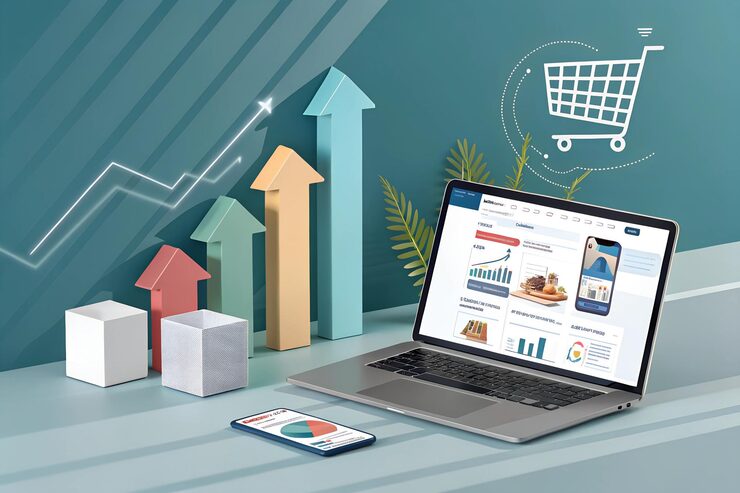Business E-Commerce Growth has become a critical focus for companies seeking to expand their reach in the digital marketplace. From small startups to large enterprises, leveraging online channels to increase sales, engage customers, and build brand presence is no longer optional—it’s essential. The digital revolution has transformed consumer behavior, making e-commerce the primary channel for buying and selling products.
Businesses worldwide are realizing that sustainable growth depends not only on marketing but also on data-driven strategies, technology adoption, and seamless customer experiences. By understanding the dynamics of Business E-Commerce Growth, companies can craft strategies that increase revenue, strengthen customer loyalty, and optimize operations.
Understanding the E-Commerce Landscape
The foundation of Business E-Commerce Growth lies in understanding the market and consumer behavior. Online shoppers today expect convenience, personalization, and fast service. Businesses must analyze demographics, purchasing patterns, and online trends to tailor their offerings effectively.
For instance, a small apparel brand shared how analyzing customer purchase histories and website behavior helped them target promotions, leading to a 35% increase in online sales over six months. Knowing the market not only guides product decisions but also informs marketing campaigns, pricing, and inventory management.
Optimizing Website and Mobile Experience
A seamless online experience is vital for fostering Business E-Commerce Growth. Websites and mobile apps must be user-friendly, fast-loading, and responsive across devices. Navigation, checkout processes, and payment options play a crucial role in reducing cart abandonment and boosting conversions.
Companies that invest in website optimization see tangible results. A tech startup noted that revamping its website interface and introducing one-click checkout increased customer retention and overall sales. Modern consumers value efficiency, and a smooth digital experience often determines whether a visitor becomes a buyer.
Leveraging Digital Marketing Strategies
Digital marketing drives Business E-Commerce Growth by increasing visibility, attracting qualified traffic, and nurturing leads. Techniques such as search engine optimization (SEO), social media marketing, content marketing, and pay-per-click (PPC) campaigns help brands reach broader audiences.
Real-life examples illustrate the power of integrated campaigns. A home decor company used Instagram ads, blog content, and influencer partnerships to expand reach, resulting in a 50% rise in monthly orders. Digital marketing allows businesses to connect with potential customers in creative ways, building both brand recognition and engagement.
Implementing Personalization and Customer Engagement
Personalization is a key factor in Business E-Commerce Growth. Tailored recommendations, dynamic pricing, and targeted emails create a more engaging shopping experience. Businesses can use data analytics to understand individual preferences and deliver customized interactions.
For example, an online bookstore increased repeat purchases by offering personalized reading suggestions and exclusive promotions based on customer browsing history. Engaging customers meaningfully strengthens loyalty and encourages long-term growth.
Utilizing Analytics and Data-Driven Decisions
Data analytics supports Business E-Commerce Growth by providing insights into sales trends, customer behavior, and marketing effectiveness. By monitoring metrics such as conversion rates, average order value, and traffic sources, companies can optimize strategies and identify areas for improvement.
A beauty products retailer used predictive analytics to forecast demand for seasonal items, adjusting inventory and marketing campaigns accordingly. Leveraging data ensures that growth strategies are not based on guesswork but on measurable performance indicators.
Streamlining Logistics and Supply Chain
Efficient logistics and supply chain management are critical for sustainable Business E-Commerce Growth. Timely delivery, accurate inventory management, and reliable order fulfillment enhance customer satisfaction and reduce operational costs.
A health supplement brand improved its online sales by partnering with a fast-shipping courier service and implementing real-time inventory tracking. Customers received faster deliveries, and the business could scale operations without delays. Efficient logistics supports growth by maintaining trust and encouraging repeat purchases.
Adopting Emerging Technologies
Technology innovation plays a pivotal role in Business E-Commerce Growth. Artificial intelligence, chatbots, augmented reality, and automation streamline operations and enrich customer experiences. Businesses adopting emerging technologies gain competitive advantages and improve efficiency.
For instance, a furniture e-commerce platform integrated AR tools allowing customers to visualize products in their homes. This interactive experience boosted purchase confidence and increased conversion rates. Embracing technology ensures businesses remain agile and responsive in the rapidly evolving digital landscape.
Expanding Market Reach
International expansion offers opportunities for Business E-Commerce Growth. Selling across borders involves understanding local regulations, payment methods, shipping options, and cultural preferences. Businesses that successfully navigate these challenges tap into new customer segments and revenue streams.
A small fashion brand leveraged localized websites, multilingual customer support, and global shipping partnerships to attract overseas buyers. Expanding the market reach transforms e-commerce operations from local to global, amplifying growth potential.
Fostering Customer Loyalty Programs
Customer retention is as important as acquisition for long-term Business E-Commerce Growth. Loyalty programs, reward points, and subscription models incentivize repeat purchases and enhance engagement. Retaining customers reduces marketing costs and strengthens brand advocacy.
For example, an online grocery service introduced a subscription-based program with exclusive discounts, which increased customer lifetime value and stabilized revenue streams. Effective loyalty strategies create a sustainable foundation for growth.
Continuous Innovation and Adaptation
Finally, Business E-Commerce Growth thrives on continuous innovation. Monitoring trends, testing new features, and adapting to changing consumer expectations ensures that businesses stay relevant and competitive.
Tech entrepreneur Sarah shared that experimenting with limited-time offers, interactive content, and seasonal promotions kept her online store dynamic and appealing. Adapting strategies to evolving market conditions fosters consistent growth and long-term success.
Read also:
bangladesh national cricket team vs sri lanka national cricket team match scorecard
afghanistan national cricket team vs england cricket team standings
south africa national cricket team vs afghanistan national cricket team match scorecard
pakistan national cricket team vs west indies cricket team match scorecard

